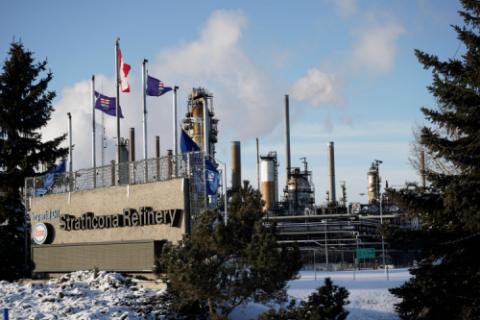Imperial Oil Ltd., a major Canadian oil producer majority-owned by ExxonMobil, has announced plans to reduce its workforce by 20% by the end of 2027. This significant restructuring aims to consolidate operations and leverage technological advancements, ultimately leading to substantial cost savings. The move comes amidst fluctuating global crude prices and increasing production from OPEC+ nations, prompting other companies in the oil and gas sector to also consider workforce reductions. This decision signifies a shift in Imperial Oil's operational strategy and raises concerns about the economic impact on Alberta and the affected employees.
Restructuring Details and Expected Savings
The Calgary-based company revealed that the restructuring efforts are projected to yield annual cost savings of approximately $150 million by 2028. These savings will be achieved through a combination of workforce reduction, consolidation of activities, and enhanced utilization of technology, leveraging Imperial’s relationship with ExxonMobil. The company expects to incur a one-time, pre-tax restructuring charge of around $330 million in the third quarter of 2025. While Imperial Oil has not yet specified the exact number of employees affected or the specific impact on its Canadian operations, the reduction will significantly alter the company's organizational structure. The announcement underscores the industry's push for greater efficiency and cost optimization in a competitive global market.
Operational Impact and Future Outlook

Despite the workforce reduction, Imperial Oil maintains that its corporate guidance for 2025 remains unchanged. The company anticipates meeting or exceeding its medium-term production and unit cost targets for its Kearl and Cold Lake oil sands operations. This suggests that the restructuring is intended to streamline operations and improve profitability without compromising production output. Furthermore, the company believes it's well-positioned to leverage its existing assets through technological advancements and strategic partnerships, ensuring long-term value creation. Imperial's decision reflects a commitment to adapt to the evolving energy landscape and maintain its competitive edge in the global market.
Consolidation and Relocation of Operations

A significant aspect of the restructuring involves the consolidation of Imperial Oil's operations. Following the layoffs, the majority of the remaining positions currently located at the Calgary head office will be relocated to the Strathcona refinery near Edmonton in the latter half of 2028. This move signifies a strategic shift towards concentrating activities at its operational sites, potentially enhancing efficiency and collaboration. The company plans to maintain only a limited presence in Calgary after the relocation is complete. This decision marks a notable shift from Imperial Oil's historical presence in Calgary, a city deeply rooted in the oil and gas industry.
Government Response and Concerns

The announcement of the workforce reduction has prompted concerns from both political and economic perspectives. Canada's Natural Resources Minister, Tim Hodgson, expressed his disappointment with the news, stating that the government is actively seeking to understand the factors driving Imperial Oil's decision and exploring ways to support affected employees. Alberta Opposition NDP leader Naheed Nenshi has also criticized the announcement, highlighting the potential impact on families and communities throughout the province. The restructuring occurs during a time when Alberta faces relatively high unemployment rates, further exacerbating the concerns surrounding job security and economic stability. The government's response reflects the significance of the oil and gas sector to the Canadian economy and the need for proactive measures to mitigate the negative impacts of workforce reductions.
Industry Context and Market Dynamics

Imperial Oil's decision to restructure its operations comes amid fluctuating global crude oil prices and increasing production from OPEC+ nations. These market dynamics have created a challenging environment for oil producers, prompting companies to seek ways to optimize costs and improve efficiency. The price of West Texas Intermediate (WTI), a benchmark for North American oil prices, has recently declined, partly due to increased oil production in Iraq. Analysts anticipate that oil prices may further decrease following the upcoming OPEC+ meeting, where members are expected to agree on production increases. This broader industry context underscores the pressure on oil companies to adapt to evolving market conditions and prioritize cost-effectiveness.
Labor Market Implications and Support Measures

The workforce reduction at Imperial Oil has significant implications for the labor market in Alberta, particularly in Calgary, which has historically been a hub for the oil and gas industry. The loss of jobs will likely affect hundreds of families and have ripple effects throughout local communities. Recognizing the impact of this transition, Imperial Oil has stated its commitment to supporting affected employees. The company plans to implement a "rigorous transition process" to assist employees in finding new employment opportunities and accessing resources for retraining and career development. While the details of these support measures are not yet fully clear, they are essential to mitigating the negative consequences of the restructuring and helping affected workers transition to new roles.
Historical Perspective and Company Strategy
Imperial Oil has a long and established history in Canada, dating back to its founding in 1880. The company has played a significant role in the development of Canada's oil and gas industry, contributing to economic growth and energy security. In 2004, Imperial Oil moved its headquarters from Toronto to Calgary, further solidifying its presence in the heart of Canada's oil patch. The current restructuring represents a significant shift in the company's operational strategy, reflecting a focus on efficiency, technology, and consolidation. This shift underscores the need for companies to adapt to changing market conditions and prioritize long-term sustainability in a dynamic global energy landscape.
Technology and Innovation in the Oil Industry
A key driver of Imperial Oil's restructuring is the increasing importance of technology and innovation in the oil and gas industry. The company aims to leverage rapidly advancing technologies to enhance efficiency, optimize production, and reduce costs. This includes implementing advanced automation systems, data analytics, and digital solutions across its operations. By embracing technological innovation, Imperial Oil seeks to improve its competitive advantage and ensure its long-term viability in a rapidly evolving market. The focus on technology also aligns with the industry's broader efforts to reduce its environmental footprint and improve sustainability performance.
Long-Term Vision and Stakeholder Engagement
Imperial Oil's decision to restructure its workforce reflects a long-term vision for the company's future. The company aims to position itself for sustainable growth and profitability in a competitive global market by optimizing its operations, leveraging technology, and consolidating its activities. Engaging with stakeholders, including employees, communities, and government officials, will be crucial to ensure a smooth and transparent transition. Open communication, collaboration, and a commitment to responsible business practices will be essential for Imperial Oil to navigate the challenges and opportunities ahead and maintain its reputation as a leading Canadian oil producer.


No comments:
Post a Comment